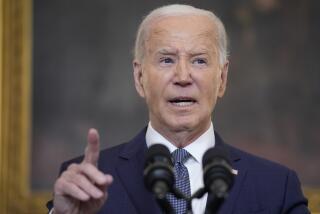U.S. Offering Serbia Carrot or a Stick on Bosnia : Balkans: President will be told that his help will lead to easing of sanctions. Without it, they’ll worsen.
- Share via
WASHINGTON — The Clinton Administration and its allies are offering Serbian President Slobodan Milosevic both a carrot and a stick today in a diplomatic showdown over Bosnia-Herzegovina, senior U.S. and U.N. officials said Wednesday.
The carrot is a quiet promise that the West will begin lifting economic sanctions on Serbia if Milosevic pushes the ethnic Serbs of Bosnia to sign a U.N. peace plan that would divide the republic into 10 ethnic provinces.
The stick, rattled loudly by both President Clinton and Russian President Boris N. Yeltsin this week, is the threat of severely increased sanctions that would “turn Serbia into a pariah state,” in the words of a senior U.S. official.
Both sides of the argument will be presented to Milosevic, the authoritarian populist who has directed Serbia’s attacks on neighboring Croatia and Bosnia, by the two U.N. negotiators, former Secretary of State Cyrus R. Vance and former British Foreign Secretary Lord Owen, at a meeting in Paris today, the officials said.
U.S. and U.N. negotiating strategy has come to focus on Milosevic because officials believe the brooding Serbian leader is increasingly sensitive to the damage that economic sanctions are doing to his country’s economy, and because they believe he can enforce his will on the Bosnian Serbs.
In talks in New York last week, they noted, Bosnian Serb leader Radovan Karadzic essentially refused to negotiate.
“Karadzic wants a risk-free, concession-free negotiated settlement,” the senior U.S. official said. “. . . The only way you are going to (get a compromise agreement) is to move Milosevic.”
Vance and Owen have proposed a settlement that would divide Bosnia into the 10 largely autonomous provinces, three each for the republic’s Serbs, Croats and Muslims and one mixed area around Sarajevo, the capital. Only the Croats have accepted all parts of the plan.
The Muslim-led Bosnian government has agreed to parts of the Vance-Owen plan, but the Bosnian envoy to the United Nations, Muhamed Sacirbey, said his leaders still want some changes in the map that Vance and Owen have proposed. The Bosnian Serbs have also agreed to parts of the plan, but they reject the map.
The Vance-Owen map would require Bosnian Serbs to withdraw from much of the territory they have seized during the past 11 months of ethnic warfare--but would leave them with 43% of the republic’s territory, some of it taken by force.
The Clinton Administration, which initially shared the Bosnians’ dissatisfaction with the map, is now tacitly urging them to settle for what they can get before the Serbs seize even more territory.
“They like the map like a kid likes castor oil,” one U.S. official said of the Bosnians, “but they are willing to work on that map.”
If the Bosnian government agrees to the plan, he added, international pressure in the negotiations “would shift solely and squarely onto the Serbs.”
“The main focus has to be the Serbs,” he added. “They’re the ones who have to solve this problem.”
In that sense, the meeting today between Vance, Owen and Milosevic could be a turning point in the negotiating effort, officials said.
The Administration suggested last month that the North Atlantic Treaty Organization begin planning for a peacekeeping force that would operate in Bosnia after a peace agreement is reached. U.S. officials have estimated that the operation would require 40,000 troops, and possibly two to three times that number.
The senior U.S. official said that any peacekeeping force would operate under U.N. authority, and NATO would provide command and communications. He said it was not yet clear whether France, a member of NATO’s political structure but not its military command, or Russia, which is not a NATO member, would submit forces to NATO control, although both countries have agreed in principle to commit troops to the force.
The U.N. negotiators are expected to remind the Serbian leader of the Clinton Administration’s vow, joined by Yeltsin on Tuesday, to step up economic sanctions against his government if he fails to cooperate.
The increased sanctions could range from stepped-up enforcement of the existing embargo to much tougher measures to “isolate” Serbia, senior officials said.
At the same time, U.N. officials said, and U.S. officials reluctantly acknowledged, Vance and Owen will promise Milosevic that the U.N. economic embargo of Serbia will be gradually lifted if he helps in achieving and implementing an agreement on Bosnia.
Russia, a historical ally of the Serbs, has insisted that such a promise be part of the U.N. negotiating strategy. American officials agreed that since the sanctions were applied to stop Serbian expansion into neighboring republics, they could be lifted if Serbia changed its policies.
A second key part of the U.N. plan, officials said, is the Clinton Administration’s promise to the Bosnian Muslims that U.S. troops will help enforce an agreement, even if that means forcing renegade Serb units out of Muslim territory.
More to Read
Sign up for Essential California
The most important California stories and recommendations in your inbox every morning.
You may occasionally receive promotional content from the Los Angeles Times.











